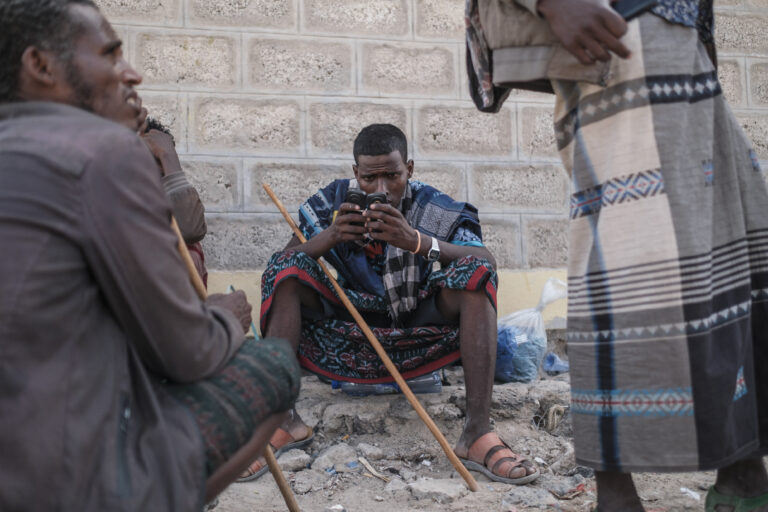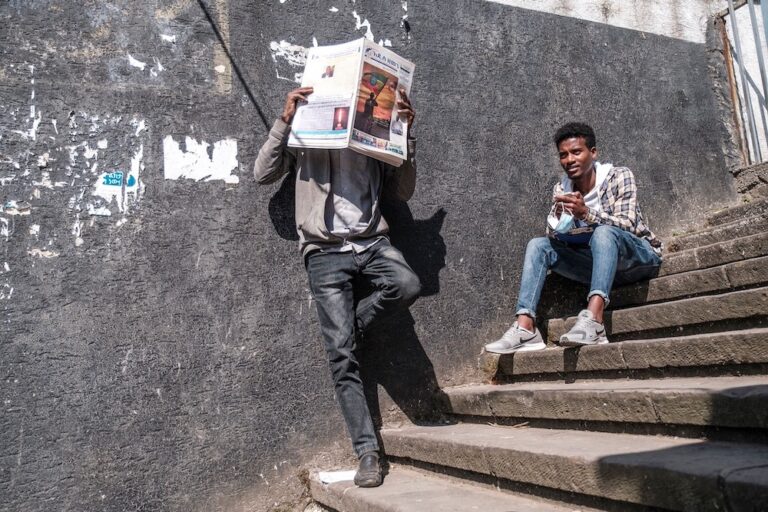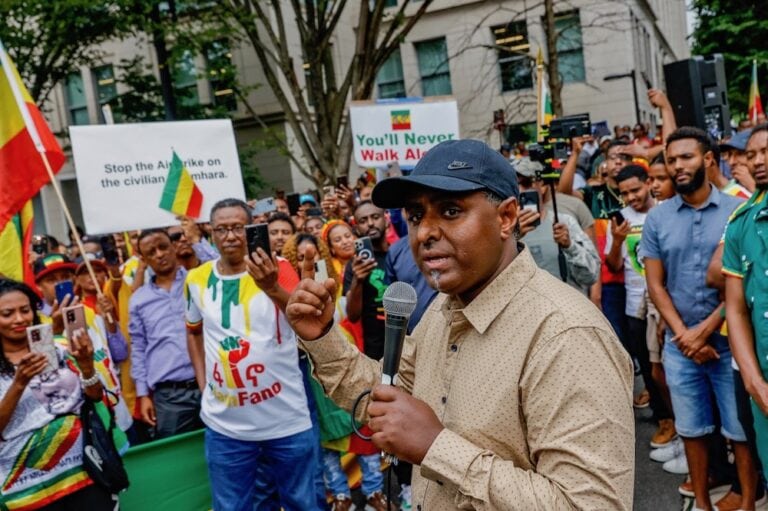(EFJA/IFEX) – The following is an 8 February 2003 EFJA press release: Journalists of the Ethiopian free press, publishers and media professionals issue joint statement in protest against the new draft press law A workshop that discussed the new draft press law was held at the Semien Hotel hall on Saturday, February 8, 2003. The […]
(EFJA/IFEX) – The following is an 8 February 2003 EFJA press release:
Journalists of the Ethiopian free press, publishers and media professionals issue joint statement in protest against the new draft press law
A workshop that discussed the new draft press law was held at the Semien Hotel hall on Saturday, February 8, 2003. The forum, in which over 300 people participated, was organized by the Ethiopian Free Press Journalists’ Association (EFJA) and free press publishers. A joint position statement was issued at the end of the meeting.
Free press publishers, editors, editorial staff members, media professionals, representatives of government institutions and civic associations, as well as other invited guests participated in the workshop. Papers were presented under the following topics, which were extensively discussed in the process of the workshop:
– the Ethiopian media situation, an overall survey
– the new press law examined from the free press perspective
– the right to access information under the new press law and the role of the executive body
– restrictions imposed on advertisements and distribution of press publications under the press law
– the right to ownership under the code of ethics and press council
Many observers were present at this unique workshop, at which free press journalists, publishers and media professionals forged a union and issued a joint position statement.
The observers included:
– former prime minister Lidj Michael Imru
– the former president of the Federal Democratic Republic of Ethiopia (FDRE), Dr. Negasso Gidada
– members of the House of Peoples Representatives
– Executive Committee members of four locally operating opposition parties
– representatives of the veteran Ethiopian Teachers’ Association, professional associations and lawyers
– representatives of the Ministry of Information
– representatives of various foreign embassies in Addis Ababa
– representatives of the Ethiopian and Addis Ababa Chambers of Commerce
– renowned personalities, veteran journalists and public relations officers
– invited guests representing various sectors of society
The following joint statement was issued by participants of the workshop, namely, the Ethiopian Free Press Journalists’ Association, publishers, editors, editorial staff of the free press and media professionals regarding the new draft press law:
We, the members of the free press community, have unanimously agreed that:
1. This workshop is a historic meeting at which we forged our unity and took a position in the interests of our common survival and well-being; we will further consolidate our cooperation to avoid shortcomings in terms of observing our professional code of ethics and overcome the obstacles we face at various stages in the performance of our activities.
2. We do not accept the new press law drafted by the Ministry of Information, on the grounds that:
– it targets the key question of democracy
– it stands in contradiction to Article 19 of the Universal Declaration of Human Rights, to which Ethiopia is a signatory; Article 29 of the Ethiopian Constitution; the New Partnership for Africa (NEPAD) decision on freedom of expression and good governance, to which African leaders have jointly agreed
– it is a law that is directed against our very existence and designed to render us completely ineffective
– any law that is issued in the future in connection with the press without the participation of publishers and newspapers is irrelevant
3. We will not limit ourselves to expressing our protest against the draft press law; we will also prepare a document that will focus on the main points around which our protest revolves, put forward the problems and recommended solutions; we will gather the support of all participants and engage in activities that are directed towards enriching the document.
4. The issue relating to the press council strictly lies within the domain of journalists; it should be established primarily by journalists and stakeholder (relevant) bodies; we should continue to gather the common views and ideas of participants and, by scrutinizing these views, reach a stage where we will prepare a solid document.
5. We are opposed to the draft press law because it has sidelined the main stakeholders, namely, the private press publishers, journalists and others who are directly concerned.
6. Whenever the government calls meetings related to the free press, it should extend invitations to all concerned parties without any discrimination; the meetings should serve as platforms for conducting democratic discussions and not as instruments for receiving direction.
February 8, 2003
Addis Ababa, Ethiopia


